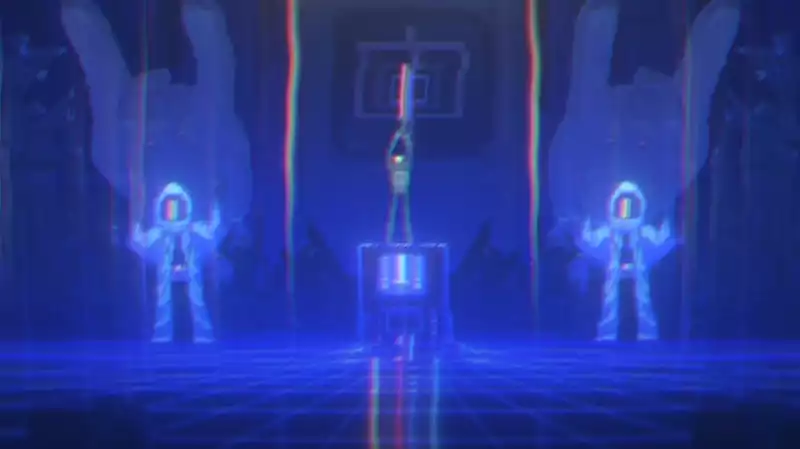It is nothing short of blasphemy to mention gaming consoles on a PC site, but in this case, we ask the desktop gaming gods to forgive us. Narita Boy is a platform action adventure that takes place in a game console that has been transformed into a complex digital empire of circuits, wires, and lines of code.
Playing as the main character, the pixel hero Narita Boy, you are summoned to save the digital kingdom from crisis. As you travel through the three regions of the kingdom, you must defeat the evil minions of HIM, a dark program that wants to destroy the Digital Kingdom. It's a typical "hero saves the world" story, but with the added twist of being inside a retro 80's video game console, and I think Narita Doji's execution of this idea is brilliant.
Every scrap and segment of the console is assigned a specific role within this fantasy world, and the world has enough lore to rival "Game of Thrones." The High Priestess of the entire kingdom is a supervisor program named Motherboard, a sentient program called TechnoFather worships complex algorithms, floppy disks serve as keys to the most sacred temples, lines of code are treated as ancient scripture There is also a certain mysticism. The game blends technology and mythology to create an interesting world.
Nor is Narita Doji's spirituality mere meaningless symbolism. Through the Digital Kingdom, we can access the memory of the Creator, the one who created this place. The Creator is treated as a god in this digital realm, but in the real world he happens to be a bald, hole-in-the-wall kind of man. As we delve into his memories, we learn how his life has affected this game, from his childhood in Japan living with his deeply religious mother to the family conflicts he faced with his father. These flashback moments are quietly introspective and nicely counteract the satirical 80s macho power fantasy present throughout the rest of the game.
Narita Boy is a combat-heavy platformer, but thankfully, your pixel hero moves smoothly. Chopping up enemies packs a punch, and there are plenty of ways to take them down without having to keep hitting the attack button. You can dodge, shoulder, and jump around enemies, attack them up close with your techno-sword, or fire virtual bullets from afar.
Enemy attacks are clearly choreographed and can be easily passed by if you learn effective techniques for each enemy. Boss fights are challenging, but not as challenging as one might expect. These dramatic encounters felt more like a way to show off the ideas behind their creation than an actual difficulty. One boss fight, in which I had to dodge a giant mechanical carp in a public bathhouse while surfing on a giant floppy disk, was quite fantastic.
Narita BOY's story is strictly linear, running around in pixel-perfect backdrops while trying to reach a clear goal. While there is some back and forth between certain areas, it is always fun whenever you need to go back twice, as the game is full of incredibly memorable scenes. In one area, two priests suspended in mid-air are connected to a computer and convulsing in mid-air with crackling electrical energy. Another striking scene is a statue of a pregnant computer program, its huge belly surrounded by ceremonial candles.
But as fascinating as they are, I was always lost in Narita Boy's world. Trying to remember the names of all the temples, sacred sites, and holy caves, much less the names of special items and programs, was confusing. Where is the Servo Horse, what is the Hacker Notebook, how do I get to the Techno Algorithm Hall, what is the Cosmovision gallery? Everything left me dumbfounded.
This combined with the graphics of the game can be a real headache. As much as I like the retro visuals, like old battered VHS tapes, the platforms and doors tend to blend into the background. Sometimes the arrows would guide me, but there were often moments when I would fall into a room and the scaffolding would blend into the landscape and I wouldn't know how to get out.
But these are minor glitches in an overall streamlined adventure. It feels good to plunge your sword into the digital heart of an enemy, and the origins of this kingdom are a wild ride of lost love, creepy cults, and flashy rock. Narita Shonen strips away the vapidity of '80s video game nostalgia and combines it with an epic fantasy story with a sincere core."
.

Comments